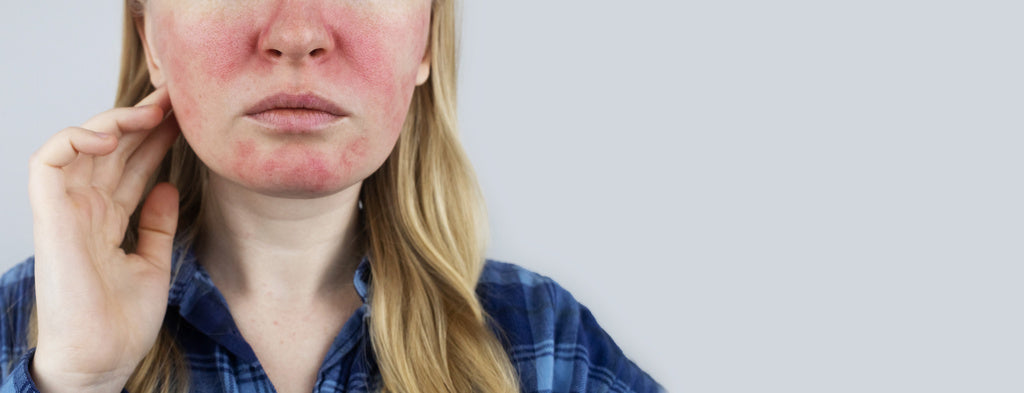Sensitive vs. Sensitised Skin: Understanding and Caring for Reactive Skin

Is your skin sensitive by nature? Or has it become sensitised over time? It’s fine if you feel a bit confused. At Jericho Skincare Australia, we often encounter individuals who struggle to understand the nuances of their reactive skin. So, today, we’ll explain the distinction to help you address your skin concerns more effectively. Scroll down to read our take on this pressing skincare issue: sensitive skin vs. sensitised skin.
So, what is sensitive skin?
It is a skin type that reacts more readily to certain ingredients, food items, or external factors. Having sensitive skin is essentially a genetic predisposition. Conditions like eczema and rosacea are often manifestations of this inherent sensitivity. Eczema, in particular, usually starts during childhood and may persist into adulthood. If you have eczema due to sensitive skin, you may experience skin flare-ups periodically, which may clear up for a time before occurring again. Eczema triggers vary among people; these can be food allergies, artificial fragrances or environmental stressors.
What causes sensitive skin?
The root cause of sensitive skin lies in your genes, an inherited trait that makes your skin more reactive and prone to irritation. It’s not something you can directly control; think of it as a characteristic you must learn to understand and accommodate.
Now, what is sensitised skin?
On the other hand, sensitised skin is a condition, not a skin type. It’s a state of heightened reactivity caused by external factors that have compromised your skin’s protective barrier. A damaged skin barrier often leads to damaged nerve endings, which can cause skin flare-ups temporarily.
What causes sensitised skin?
Sensitised skin can be due to various factors, including harsh skincare products, over-exfoliation, overuse of active skincare ingredients (especially when you have a ten to 15-step skincare routine!), climate & environmental stressors, or certain medications. Your lifestyle can also play a role; if you lack sleep, consume an unhealthy diet and feel too stressed most of the time, you can have damaged skin barriers. It’s essentially your skin’s way of saying, ‘Enough! I need a break!’
So, how can you tell the difference?
In sensitive skin vs. sensitised skin, how can you tell the difference? It can be tricky, but there are a few telltale signs to distinguish the two. Here’s a quick rundown:
Sensitive skin:
- Genetic predisposition, an inherited trait
- Reactions tend to be more consistent and predictable.
- Often triggered by specific ingredients or environmental factors
- Conditions like eczema and rosacea are manifestations of sensitive skin
- Symptoms of sensitive skin may include redness, itching, dryness, flakiness & tightness.
Sensitised skin:
- Not a skin type but a condition caused by external factors
- Reactions can be more sudden and intense.
- This can occur even with products/environments previously well-tolerated.
- Caused by compromising the skin’s protective barrier
- Symptoms of sensitised skin may include heightened reactivity and irritation, stinging or burning sensations, redness and inflammation, dryness & flakiness.
To sum it up, sensitive skin is an inherent trait, while sensitised skin is a temporary state of hypersensitivity caused by external factors like harsh products & over-exfoliation.
Can sensitised skin turn into sensitive skin over time?
It depends. If the triggers causing the sensitisation continue to impact the skin without letting it heal and restore its barrier function, the sensitisation can become more severe and last longer. Prolonged sensitisation and constant insults to the skin can potentially lead to a more permanent state of sensitivity, where the skin becomes genetically predisposed to reacting more readily to certain ingredients or environmental factors, similar to sensitive skin.
However, if you’ve given proper care to your sensitised skin, it can return to its normal, non-sensitive state. How do you do that? You must eliminate the triggers, use gentle, barrier-repairing products, and allow your sensitised skin to recuperate.

How can you take better care of your sensitive skin?
If you have sensitive skin, a gentle and minimalistic approach is key. Here are some steps you can take to ensure your skincare routine suits your specific skin type:
- Use Gentle Products: Pick gentle, fragrance-free, and hypoallergenic skincare products to avoid irritation. Look for products labelled ‘for sensitive skin’ or formulated with soothing ingredients like aloe vera, chamomile & green tea.
- Simplify Your Routine: Stick to a minimalistic routine with fewer products to reduce the risk of irritation. Avoid harsh exfoliants, retinoids, preservatives and products with potential irritants like alcohol or sulphates. If you have eczema, read our gentle skincare routine for eczema-prone individuals for more tips.
- Introduce New Products Slowly: When trying new skincare products, introduce them one at a time and monitor your skin’s reaction. This will help you identify any potential irritants.
- Protect Your Skin from Sun Exposure: Use a broad-spectrum, mineral-based sunscreen with a high SPF to shield your sensitive skin from UV damage.
- Boost Skin Hydration: Incorporate gentle, fragrance-free moisturisers to support your skin’s barrier function and prevent dryness, which can exacerbate sensitivity.
- Get Professional Help: Don’t hesitate to consult a dermatologist if your sensitive skin persists or worsens. They can help identify the underlying cause and provide targeted treatment options.
How can you take better care of your sensitised skin?
When your skin is in a sensitised state, you must give it a break and allow it to heal. Follow these steps to improve your skincare routine:
- Simplify Your Routine: Like caring for sensitive skin, you must take a minimalistic approach to heal your sensitised skin. Use gentle, fragrance-free, and hypoallergenic formulas to avoid further irritation. It’ll also help to keep your routine to fewer steps to lessen your skin’s exposure to multiple skincare products.
- Focus on Barrier Repair: Sensitised skin often has a compromised skin barrier, which can lead to increased sensitivity and irritation. So, look for products containing ceramides, niacinamide, and antioxidants, as these ingredients help repair and strengthen your skin’s protective barrier.
- Avoid Potential Irritants: When shopping for skincare items, steer clear of harsh exfoliants, retinoids, and products containing potential irritants like fragrances, alcohol, or sulphates. These can further aggravate sensitised skin and delay the healing process.
- Incorporate Soothing Ingredients: As you steer clear of potential irritants, you must also be intentional in looking for calming ingredients like aloe vera, chamomile, green tea, and colloidal oatmeal. These can help reduce inflammation, redness, and irritation associated with sensitised skin.
- Protect Your Skin from Environmental Stressors: Sensitised skin is more vulnerable to environmental factors like UV rays, pollution, and extreme temperatures. So, use a broad-spectrum, mineral-based sunscreen and limit exposure to harsh environmental elements while your skin is healing.
- Be Patient and Consistent: Healing sensitised skin takes time and consistency. Stick to your gentle and simple routine and avoid introducing new products until your skin has fully recovered its protective barrier.
- Seek Medical Help: If the symptoms of your sensitised skin persist or worsen, it’s advisable to consult a dermatologist. They can help provide targeted treatment options to help your skin heal and recover more effectively.
Shop for gentle skincare products today.
Now that you understand your reactive skin better, you can be more intentional and mindful of how you care for it. Start by refining your skincare routine and incorporating gentle and organic products from Jericho Skincare Australia.
Whether you need a sulphate-free cleanser, gentle moisturiser or sulphur soap good for eczema & other flare-ups, we have it here. Shop online today!






